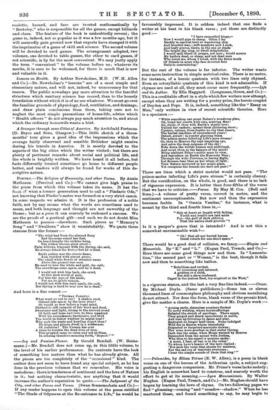Handbook of Games. Vol. I., " Table Games." By Dr.
William Pole, Major-General Drayson, Robert F. Green, and "Berkeley." (G. Bell and Sons.)—In the "publisher's note," we are told there is still a steady demand for the first edition of this book, published in 1850. This revised edition is, then, most acceptable. And the chief reason is undoubtedly the addition of reversi, a new and highly scientific game. The chapters devoted to reversi problems will delight many; they are full of instruction, and will place reversi on an even higher plane of popularity than it now occupies, and will confirm the belief of many in its scientific possibilities. Solitaire and some varieties of bagatelle have been added. Chess has been added, too, with some examples of masterpieces and a number of end-games. But chess, for the same reason that it was omitted in -the first edition, can be left to take care of itself ; it has already a 'vast literature. Still, it must always find a place in a handbook of games, and this contribution is, moreover, by Mr. Robert F. Green. A great change and expansion has been made in the chapters on draughts and backgammon; in fact, most of the book has been re- written, especially dominoes and its varieties, if we mistake not. And, generally speaking, the chances, the odds for and against cer- tain combinations, seem to have received fuller treatment. Billiards, .with the modern growth of the spot-stroke, and the recognition of the scientific value of strength, has needed a more thorough, though still a necessarily elementary treatment. Rouge-et-noir,
roulette, hazard, and faro are treated mathematically by " Berkeley," who is responsible for all the games, except billiards and chess. The feature of the book is undoubtedly reversi ; the game is, indeed, not so popular as it was a few months ago, but it will assuredly gain ground now that experts have stamped it with the imprimatur of a game of skill and science. The second volume will be devoted to card games. The arrangement adopted, two volumes, one devoted to table games, the other to card games, if not scientific, is by far the most convenient. We may justly apply the term " convenient " to the volume before us ; whatever its merits, it is sure to be welcomed, for there is much that is new and valuable in it.























































 Previous page
Previous page